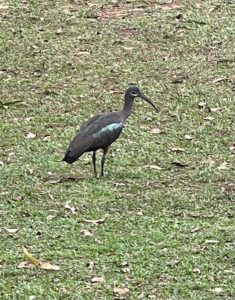Today I said goodbye to the three German medical students that have been in the guest house with me for the past three weeks. Hopefully our paths cross again in the future! The rest of the day was very quiet and relaxed, filled with studying for my board exam and the doctors’ and medical officers’ kids playing soccer and tag outside. I also perused the house’s bookshelf and found a guide to Ugandan culture (see below). It was a short read so I finished it in a couple hours and, after being here for three weeks, I can attest that it is very accurate and would be extremely helpful to read ahead of time for anyone visiting Uganda. In this book, it opens with a poem from Rudyard Kipling which I think really embodies a lot of the feelings that we can have when inserted into a society different than our own and reminds us to be openminded during those times as well. I thought for today’s post I would include it here for your reflection. Enjoy!
We and They:
Father and Mother, and Me,
Sister and Auntie say
All the people like us are We,
And every one else is They.
And They live over the sea,
While We live over the way,
But-would you believe it? –
They look upon We
As only a sort of They!
We eat pork and beef
With cow-horn-handled knives.
They who gobble Their rice off a leaf,
Are horrified out of Their lives;
While they who live up a tree,
And feast on grubs and clay,
(Isn’t it scandalous? ) We look upon
As a simply disgusting They!
We eat kitcheny food.
We have doors that latch.
They drink milk or blood,
Under an open thatch.
We have Doctors to fee.
They have Wizards to pay.
And (impudent heathen!)
They look upon We
As a quite impossible They!
All good people agree,
And all good people say,
All nice people, like Us, are We
And every one else is They:
But if you cross over the sea,
Instead of over the way,
You may end by (think of it!)
Looking on WE
As only a sort of They!
Lugandan word of the day: mwattu (“muah-too”, please)
Medical learning point of the day: Antibiotic resistance is a rapidly increasing problem in developing nations, especially sub-Saharan Africa. The nations here have been using the same handful of antibiotics for the past 50 years and, whether because of supply chain issues or finances, are not able to easily access other more potent antibiotics. For example, a small study at this hospital showed that over 50% of cultures that grew E. coli (urine and wounds) were resistant to ceftriaxone which is one of the best IV antibiotics they are able to give here.


